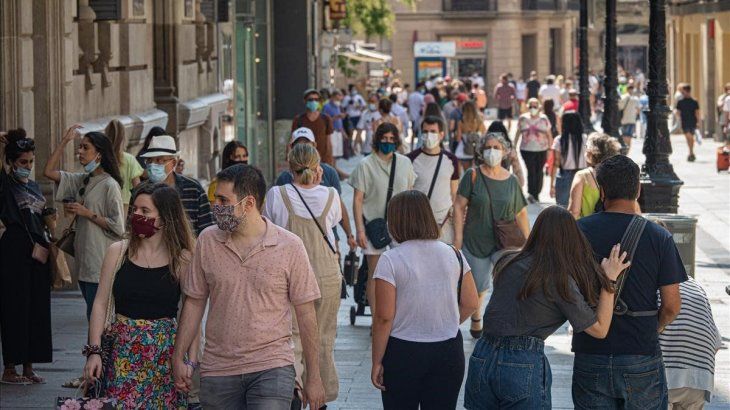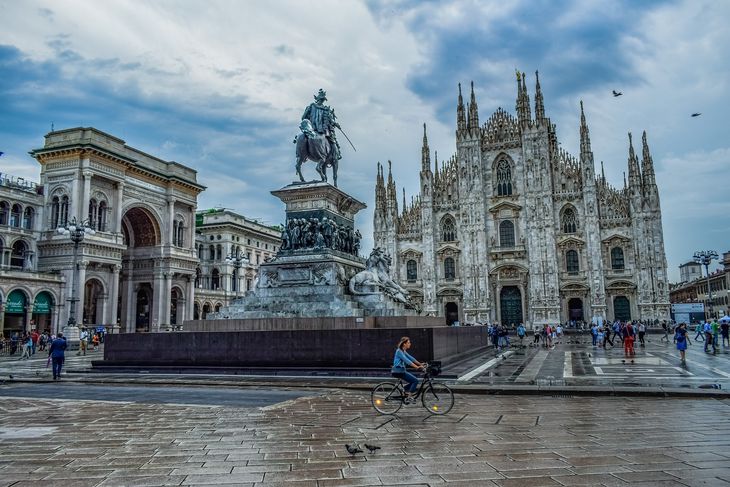To obtain answers, the online bank N26 analyzed the spending and saving data of more than 380,000 customers from 5 European countries (Spain, Germany, Austria, France and Italy) between January and August 2022. We discovered what they are saving the most on despite inflation, residents of which countries still spend large sums on vacations and restaurants, and whose income is growing. In addition, we also identified differences between the saving and spending habits of men and women. Read on to find out what we found out.
Customers in Spain and Germany saved more
The eurozone ended 2021 with an annual inflation rate of 5%. Even so, in August 2022 it reached an astonishing 9.1% and in September it reached 10%. In our analysis, which took place from January to August 2022, the steepest jump occurred between February and March: from 5.9% to 7.4%. This coincided with the Russian invasion of Ukraine, which continues to have a huge humanitarian and economic impact in Europe and other parts of the world. Given the importance that this event had—and continues to have—we have also compared data from two periods this year as part of our analysis: January-February and March-August.
Of all the markets we have studied, N26 customers in Spain have the highest savings rate overall. Spanish customers saved, on average, 6.6% of their income between January and August. They are followed by Germany, where customers saved 5.1% of their income on average. In France, customers had an uncertain start to the year, but, on average, they have recovered their positive balance and saved 0.1% of their income each month, or around €3.55. Italian customers showed the biggest declines in their average savings, and their savings habits fluctuated the most; in the months of April, May and August, they also spent more than they earned.
Mobilization against pardons Madrid
Spain’s right wing mobilized against Sánchez’s plan to pardon Catalonia’s pro-independence leaders.
Photo: Reuters
Government initiatives in Spain and Germany have been able to help many residents have been able to save. For example, at the end of March the Spanish government introduced a discount of 20 cents per liter of gasoline and diesel for all drivers in Spain. In addition, the “Iberian exception”, approved in June by the European Commission, limited the price of gas for electricity production, which considerably reduced the electricity bill. In Germany, meanwhile, the €9 ticket, a monthly pass for travel on public transport and regional trains around the country, could have given Germans more opportunities to save.
European women saved €17 a month
In line with the gender pay gap, our data shows that men earn substantially more than women (on average) in all study countries, and by “substantially” we mean approximately 39% more. Despite this, between January and August women saved a higher proportion of their income (5.9% on average, compared to 3.7% for men). Speaking in total amounts, the average monthly savings of women amounted to €112.20, while that of men was €95.20 during the same period. This is in line with findings over the same period, which may indicate a broader, longer-term trend.
March was the month with the highest savings for both sexes. In all countries, both women and men saved more in March than in any other month in absolute terms: €222.36 and €202.57 on average, respectively. This coincided with the Russian invasion of Ukraine, but the findings were similar in 2021. So despite macroeconomic shifts and geopolitical turbulence, the March savings spike could be a trend that continues throughout the year. On the other hand, May was the worst month in terms of savings, both for women (who saved only 3.2% of their income, on average) and for men (who saved only 0.1%). August was the second worst month, which may indicate that the off-season months leading up to and following the summer holidays could be times of higher spending than usual.
Despite record levels of inflation, customers in Spain reached their maximum savings between March and August
Of all the countries studied, Spain experienced the highest inflation rates at a general level. But it is interesting to know that N26 customers in Spain increased their average revenue from 4.6% in January and February, to a surprising 7.2% from March, which is a relative increase of 57.2%. This could mean that the price increase has encouraged Spanish customers to save more. Following the general trend in the EU, Spanish users also saved more in March, specifically 11.1% of their income, or €177.89, on average.
Segmenting by geographies, we see that Barcelona is the Spanish city with the highest savings rate (6.89%), followed by Madrid (6.21%), and Seville would be in last place with a 3.57% percentage of savings over their monthly income.
Barcelona.jpg

Austrians have also increased their savings notably since March; the proportion was 5.8% of their income, on average, between March and August. This percentage contrasts with -2.9% in January and 1.44% in February. Savings rates have also increased in France since March, when clients increased their savings from -2% to 0.8% of their average income; It might not sound like much, but it represents a relative increase of 140%. A closer look reveals an outlier month: in January, French customers spent, on average, 4.5% more than they earned. That makes the August results even more striking: on average, users in France saved 2.1% of their income.
Income rose worldwide since March, but savings hit in Italy and Germany
In all countries studied, revenue increased between March and August, compared with January and February, although the increase was modest in some markets. Austrians benefited from a significant increase, as receipts were 17.7% higher, on average, than in January and February. This trend was also observed, although to a lesser extent, in Germany, where earnings in the period from March to August were 6.9% higher, on average, than in January and February.
italy-milan

Pixabay
Despite this, Germans have only been able to save about half as much since March as they had in the first two months of the year, and even so, their level of saving was generally good. This difference exists both in absolute amounts in euros and as a percentage of revenue. However, the introduction of the €9 pass allowed Germans to save €119.30 in the month of June, almost €74 more than in May, the month with the least savings.
According to the data, it was in Italy where savings experienced the biggest drop. After managing to save 4% of income in January and February, on average, the proportion fell to 0.6% in the period from March to August. The relative change is -84.2%. It should be noted, however, that average revenue increased by 14.7% among Italian customers from March to August, compared to January and February. This was the second highest relative increase in our study, after Austria.
Spending on food and various consumer products fell in France and Spain, but skyrocketed in other countries
We also see notable trends in spending. Signs of inflation were particularly noticeable in the categories “Food and Consumer Products” and “Transportation and Vehicles”.
Across all spending categories, Austrians spent the most on food and other consumer products, a share that increased by 8.6% on average (in total euros) in the March-August period, compared to January and February. On the other hand, Germans spent an average of 9.2% in total euros on food and consumer products between March and August, compared to their spending in this category in previous months. Italy experienced the largest increase in total euros in spending on food and consumer products, at +15.6%. But it’s not all bad news! In France, spending on food and consumer products as a share of median income fell by 8.5%, relative to spending in January and February. This trend was also observed in Spain (although to a much lesser extent), as citizens spent 1.0% less of their average income in this category.
Supply chain problems also impacted the automotive and transportation sector, so corresponding spending increased everywhere, especially in Germany and Italy. From March onwards, Italy showed the largest increase in spending on “transport and vehicles” of all the countries studied, with a whopping 53.5% increase in the total amount spent, compared to January and February. In Germany, spending increased by 39.9% on average, or an extra €24.95 per month. While the increase recorded in France was high, an increase of 38% of the total amount spent, it was the country with the smallest increase in the study.
Germans go to bars and restaurants, while Italians prefer the beach
In this period of great turmoil, it is not surprising that customers in some countries decided to switch off and relax. Germans, for example, spent more time in bars and restaurants than any other country in our comparative data. His spending in this category went from 3.2% of his average income in January and February to 4.3% from March onwards; a relative increase of 31.9%! The Austrians followed closely, with an increase in spending in these establishments of 26.5%, from 3.6% of average income to 4.6%. In the exercise of their fiscal responsibilities this year, the Spanish were the ones who spent the least in this category, 9.3% of their income, on average.
For their part, Italians set out to enjoy life in summer. Their travel budget increased to 5.6% of their income (€75.95 per month, on average), in the period from March to August. Given that Italian customers only spent €36.69 per month on travel in January and February, the relative increase is 107% (in total euros). Meanwhile, Spain increased its travel spending by 68.8% (in total euros) between the January-February and March-August periods. For German customers, there was a modest (although not negligible) increase in the travel budget, which amounted to 53.9% (in total euros spent) during the same period.
Source: Ambito
David William is a talented author who has made a name for himself in the world of writing. He is a professional author who writes on a wide range of topics, from general interest to opinion news. David is currently working as a writer at 24 hours worlds where he brings his unique perspective and in-depth research to his articles, making them both informative and engaging.




